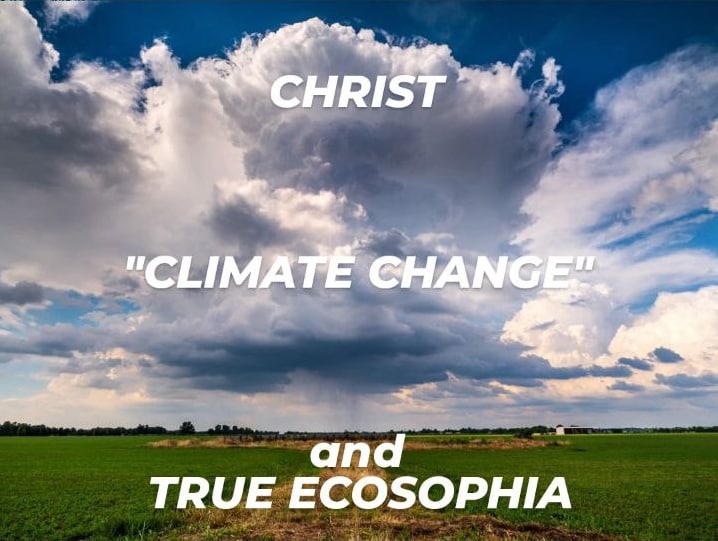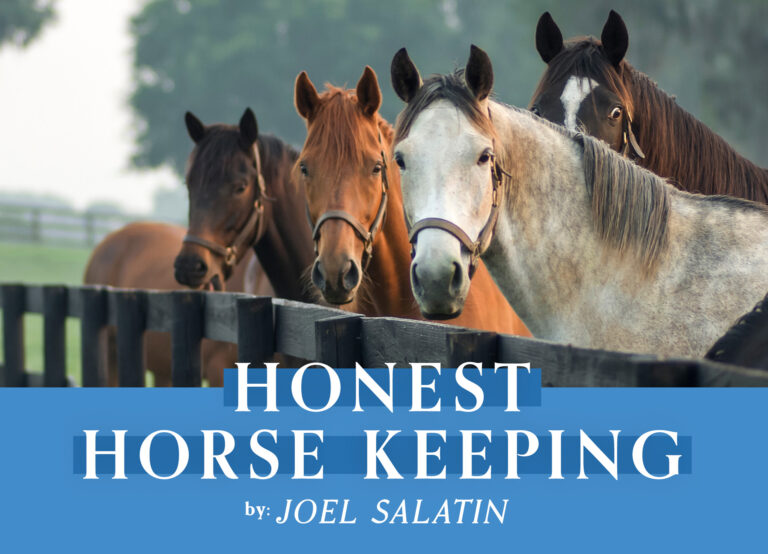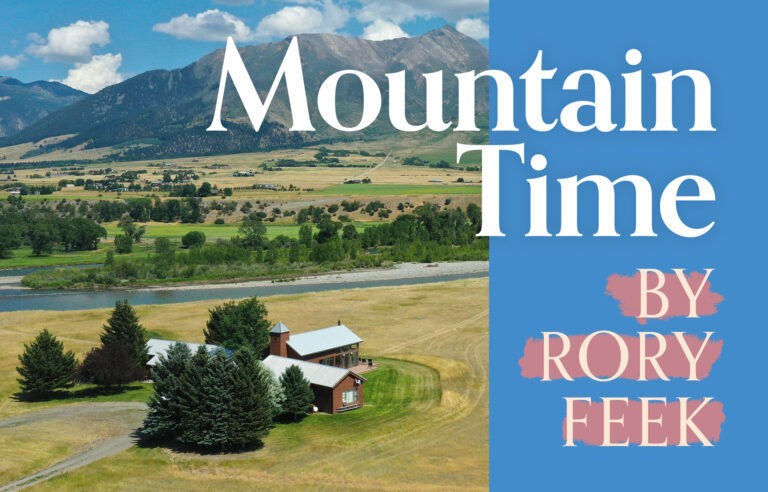As Christians, we know that “climate change” is obviously real. It’s so real that it can devastate entire nations in the span of a week. And the realest part of all is that climate change is anthropogenic: human-caused. But we also know that climate change has nothing to do with carbon dioxide.
In fact, climate change is not at all what the UN’s “Intergovernmental Panel on Climate Change” says it is. It isn’t caused by overpopulation, it isn’t caused by a “Greenhouse Effect,” and it doesn’t threaten humanity with extinction. We can tell that the entire mainstream narrative of climate change is demonic, because of its purpose: it is designed to trigger anxiety and fear. This narrative is in direct opposition to the Lord’s command to “Let not your hearts be troubled nor fearful.” (John 14:27)
To fight the climate scam, we have to do three things: First, we must understand its spiritual roots. Second, we have to articulate a Christian “wisdom of nature”: An Eco-Sophia (As compared to Eco-Logos or ecology, meaning “knowledge of nature”). Third, we have to live our faith with a righteous, responsible relationship with the rest of God’s creation.
Part 1: Secular “Climate Change”
“Behold, I will rain bread from heaven for you… ye shall see the glory of the Lord.”
Exodus 16:4-7
These days, it’s the climate of fear that is warming, not the climate of weather. And the blame is placed on humanity itself. Important experts wring their hands because there are too many people eating too much meat and not paying enough taxes! Driven made by self-importance and fear, these experts prescribe global insanity as the “climate solution.” Here is a short list of demands from the climate mafia:
- Count and track all of the carbon on earth, monitoring every tree, every bug, and every human being.
- Assign every person a “carbon budget” to determine how much food and fuel they can use.
- “Rewild” large swathes of farmland back to “natural” habitats.
In other words, the idea is to create a dystopia of total control in the name of protecting “nature.” It’s enough to make one furious, if not afraid. But we have to remember that even this, the climate scam, is in the hands of God. Knowing this, we can understand the real cause of climate change.
God is allowing the climate scam because of the weakness of our faith in Him. Our culture has been coaxed towards a materialistic worldview, wherein it seems possible to contemplate “nature” as something other than God’s creation. Modern “scientific” institutions aim to manipulate physical matter independently of the power of God.
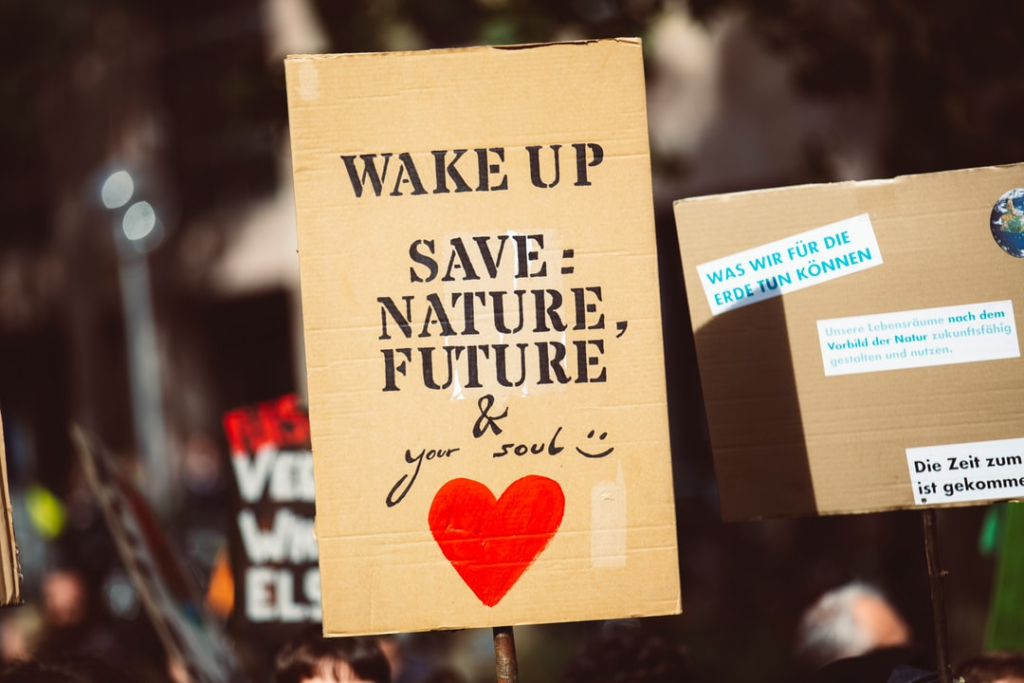
Sadly, some Christians in high worldly places toe the U.N.’s climate-change line. They lament the “crisis of climate change,” and insist that it’s our God-given responsibility to reduce carbon emissions. Of course, this responsibility comes from Luciferian organizations such as the U.N. and the Club of Rome, which aim to replace Christian culture and morality with technocratic managerial control. Christians should be suspicious of any organization that demands that nations guarantee “abortion rights” in order to receive food aid. The red flags are flapping in the winds of incessant propaganda, but many are blinded by their pride, and many more have unconsciously internalized a materialist worldview, forgetting the lessons of Holy Scripture.
Modern climate change rhetoric, especially when echoed by Christians, calls to mind the malignant murmuring of the Israelites in the wilderness, as described in Exodus 16. Immediately after being miraculously liberated from Egypt, the Israelites began to complain that Moses and God brought them out into the middle of nowhere to die. The Israelites at that time were as indignant as Greta Thunberg, and as faithless as young people who “don’t want to bring a child into a world this messed up.”
The Israelites’ complaints earned them condemnation. According to St. Cyril of Alexandria, they would have been correct to ask God to provide for their needs, and to trust that whatever He gave was for their spiritual benefit: “Give us this day our daily bread.” In a way, the Israelites’ hunger in the wilderness was a gift from God: an opportunity to practice deeper faith. The trial was also a test for how God’s people would receive such a gift; the Israelites failed, accusing God instead of thanking and entreating him. Thus, they earned exile in the desert. But God, in His infinite mercy, sent manna and quails to nourish them for their journeys. The story of the manna contains several crucial lessons for us to consider both secular and Christian conceptions of “climate change.”

The story of the manna shows us that real problems – ecological and otherwise – that afflict human societies come from sinful reactions to the challenges that God gives us. These challenges are meant to lead us to wisdom and communion. We fail to rise to the challenge when we disobey God. This is illustrated by the nature of the manna’s perishability. When the manna first came down, Moses said:
“Let no man leave of it till the morning…” But some of them left of it until the morning, and it bred worms, and stank.”
Exodus 16:19-20
The manna decayed – but not because manna was inherently perishable. Indeed, the manna stayed pure and edible over the night before the sabbath day, when no more manna could be gathered. The decay happened because the Israelites disobeyed God’s command. The root of this disobedience, according to St. John Chrysostom, was covetousness, a sin that spiritually stinks and decays one’s soul. In this story, Scripture shows us that spiritual transgressions, such as covetousness, can cause a corruption of physical nature.
The Israelites coveted three things: convenience, comfort, and control. It would be convenient for the Israelites to not have to glean the manna, tomorrow. They would feel more comfortable knowing that they had some manna put up in the kitchen. They could control their own food source, without relying on God’s provision, if they were to hoard some manna overnight.
In our time, our society also fiercely covets convenience, comfort, and control. Convenience has meant ubiquitous disposable plastic and industrial fast food that can now be ordered with a swipe of a thumb. Comfort has meant an overindulgence in food, to such a degree that more people now perish from obesity than from hunger. The obsession with control finds pure expression in the contemporary production of bread: modern wheat farmers often spray herbicide on their fields at the end of the summer, to hasten the drying process of the wheat plants, in order to ensure that all of the grain can be harvested before an autumn rain. This contaminates much of our country’s wheat with herbicide residue, which leads (ironically) to gluten intolerance. Sinful strategies always backfire.
Many of the proposed policies that promise to “solve the climate crisis” heap covetous sin upon covetous sin. They rely solely on our human cleverness, rather than on God. Such spiritual putrefaction, such a lack of eco-sophia, is bound to backfire and make our ecological problems worse than ever, unless we repent.
Part 2: Christian Climate Change
Modern civilization, saturated with sin, is living on borrowed time, or rather, borrowed grace. The Lord is merciful – He “Sendeth rain on the just and the unjust,” (Matthew 5:45) to give us time to repent and learn to love Him back. It’s not for us to know how long God will forbear punishment, or an exact date of when His retribution will reign down. God changes the earth’s climate on his own time.
Indeed, the Scriptural conception of climate change is, unlike the secular version, incalculable and unquantifiable. It is a matter of faith and an encounter with the inscrutable mystery of God’s economia – his cosmic plan for our spiritual development. Natural disasters, like illnesses, can be blessings: they can call people to repentance and to unity, they can incite more intensity of prayer, and they can forestall us from committing worse sins.
One of the most brutal passages of Scripture shows the potential violence with which nature can express God’s will. In 2 Kings 2:23-24, Elisha goes up to Bethel, where a group of young men (probably warriors) ridicules (and probably threatens) him. God sends two she-bears – a fitting representation of the awesome power of nature – who kill 42 of the young men. God was not simply protecting His prophet. According to St. Augustine, Bethel was a center of idolatry, and the young men were probably instructed to ridicule the prophet of God by their parents or commanding officers, who needed to learn to fear God because they wouldn’t love Him. The boys’ deaths may have made their parents repent and honor the prophet. The story shows a divine feedback loop: spiritual transgression causes violence from nature, which provokes, in the best-case scenario, spiritual repentance.

The relationship between the spiritual and the natural can offer us hope. Christ enabled St. Peter to walk on water for as long as his faith outshone his fear. In our modern times, St. Porphyrios describes a holy man breaking a long drought almost immediately, through intense, focused prayer. St. John of Shanghai and San Francisco protected his refugee flock from a vicious typhoon in the Philippines through fervent prayer.
God is in complete command of His creation.
During their wilderness wanderings, the population of Israel was probably over 2,000,000 people. The Sinai Peninsula, being a barren desert, couldn’t have supported such a population for 40 days, much less 40 years. The manna, which sustained the entire nation, was a profound miracle wherein God temporarily transcended the laws of nature for his people. God can and will work a miracle any time it is spiritually beneficial for us. This should comfort anybody who has ever worried that climate chaos could cause “the extinction of humanity” or the irreversible destruction of living nature. We know how this earth’s story will actually end – on God’s terms and timeline. In the meantime, we need to remember salt.
In the verses immediately preceding the bear attack in II Kings, Elisha healed the spring of the waters of Jericho by casting salt into the source. This seems strange: How can salt heal a spring of water? Like any strangeness in Scripture, the story calls us to look closer, and see a miraculous symbol at work: we are called to be the salt of the earth, called to bring forth springs of living water, called to bless all creatures of creation.
To be salt is difficult. But the difficulty can be borne when we give it to God. Most of us don’t need to do this by digging into esoteric conspiracies. A humbler and more hopeful – and therefore more graceful and productive – approach can be found in Psalm 104. Here, the psalmist sings praises to the wonderful complexity of creation. He describes how “The young lions roar after their prey, and seek their food from God,” and then, “The sun ariseth… and man goeth forth unto to his work and to his labor until the evening” (Psalm 104: 21-23).
We are called not to covet convenience, but rather to rise early and work, to live a selfless, active faith and exercise wise dominion upon the rest of creation.
This is Eco-Sophia, and we can practice this wisdom every day.
Part 3: Practicing Natural Wisdom
To live in God-given harmony with nature is, like many gifts of grace, simple but not easy. The practice of Eco-Sophia will naturally vary across the various watersheds and climates of the country. But there are some universal principles that can guide us:
- Know your natural neighborhood. St. Maximos the Confessor, following St. Paul in Romans 1, wrote that the natural world is another type of Scripture. With loving study, nature can reveal spiritual Truths. Nature can shape our souls to grow in beauty and strength. Go outside and do more than “touch grass” – learn about native grasses, learn where to find healing herbs, learn to truly see the natural world. The best and truest science, after all, has been done by Christians, as a way to illumine the glory of God.
- Say “NIMBY.” Not in my backyard. This is where it gets political. If you live in an agricultural valley that gets a lot of sun and you have a liberal governor, your land is threatened by solar power projects. Yes, they’ll come in and install an inefficient electrical system rife with heavy metals, on fertile land. At least they will if they can – if they don’t face strong, unified political opposition. Call out “green” politicians for the ecological havoc they wreak. Take better care of your local region than the climate mafia ever could, and be vocal about how and why you do it.
- Know Farmers, Know Food. You don’t need to grow all your own food. You don’t even need to grow any of your own food (though it would be great for your soul, if you did). BUT you do need to know all of your food. Who grew it? You should be supporting Christian families, with your food money. Local food system efforts are too often dominated by “intersectional” leftism. You can’t afford not to make sacrifices, if you need to, and pay a little extra to source food from your own people. In spiritual, political, and nutritional terms, cheap food is extremely expensive.
- Speak about the dire natural consequences of spiritual transgression. Traditional Christianity does not bless birth control, for basic moral reasons. The liberal response has been, “What’s the harm?” Of course, the harm will manifest in many ways that even liberals will lament. Now, birth control has contaminated many fisheries and caused hormonal havoc. In recent years, we have discovered transsexual fish, which can neither reproduce nor defend themselves, causing population collapse. St. Paul told us: All of creation groans for human repentance.
And above all, of course, pray daily with ever-deepening faith. Remember that God can change the climate at any moment. Give thanks.
We and all creation are showered with blessings. The Lord “will rain bread from heaven.” This bread may be physical, feeding our bodies, or it may be spiritual bread, the Word of God wherein St. Paul urges us to “Walk by the spirit, and not gratify the desires of the flesh” (Galatians 5:16). This bread, the Word, will help us to endure discomfort and insecurity. It will help us share earthly gifts without covetousness. It will help us to pray and fast. In nature, we will see a living reflection of Scripture, and in Scripture, the key to understanding the nature of nature.
And we will focus not on how to control the climate of earth, but rather on how to cultivate our own souls’ ability to live in the climate of heaven.
This article is a modified version previously published at https://davidtreebeard.substack.com/ where the reader can find more of his musings.
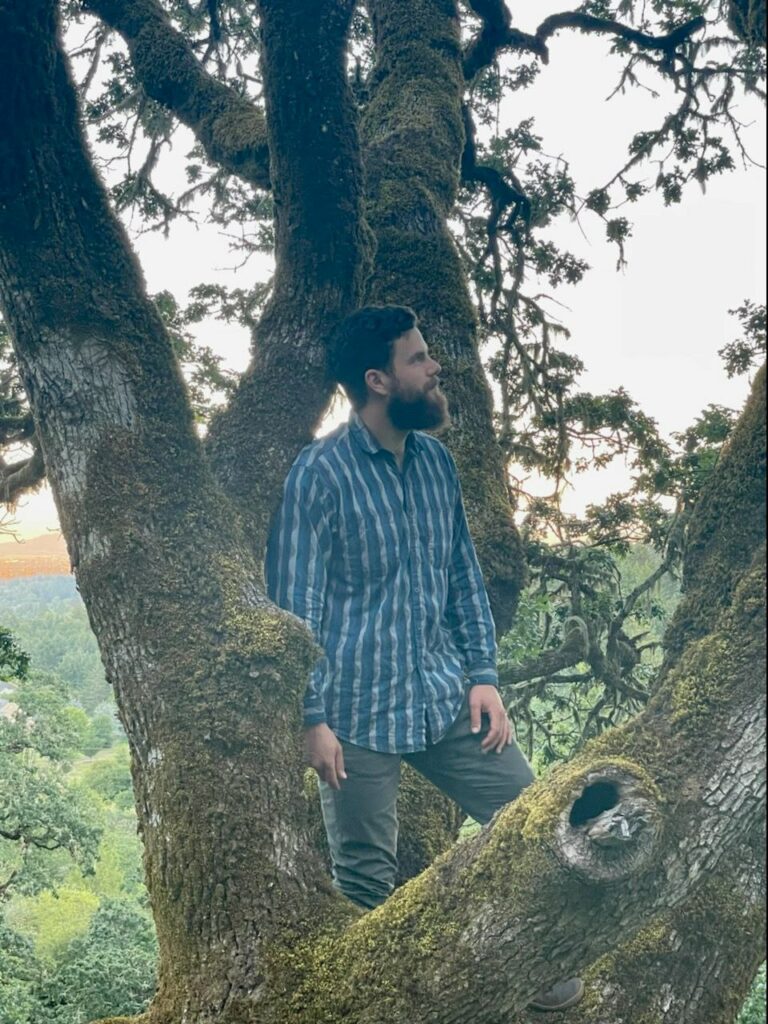
David Treebeard is an Orthodox Christian, organic writer, and creative farmer. His company, Steadfast Provisions, crafts traditional nutrient-dense, nonperishable foods based on pure pastured animal fat.


